INTERVIEW: FIRE & DUST MEETS EMILIE LAUREN JONES
We meet as agreed, beneath this tree
not sure whether to hug or shake hands
we stand, awkwardly at first,
until she motions and we sit down.
Her curved shoulders
remind me how mum says not to slump,
she shrugs as if sensing what I’m thinking.
I tell her I envy her natural ginger hair,
mine comes from a bottle.
‘Plastic?’ she asks,
I nod.
Then enquire about where she grew up,
was she always from round here?
‘No,’ she says
the monsters took her home away
with loud machines and metal blades
and now the trees she swung on in childhood are gone.
But what about her friends?
‘Scattered’ she says
like berries dropped from the beaks of birds.
I hold my hand up as if touching a mirror
she responds
her palm slightly larger,
fingernails wider, creased.
Is she safe?
‘For now,’ she says,
birdsong masks the distant sound
of falling branches.
-‘Conversations with an Orangutan’ (p.33)
Visit Emilie’s website to buy your copy!
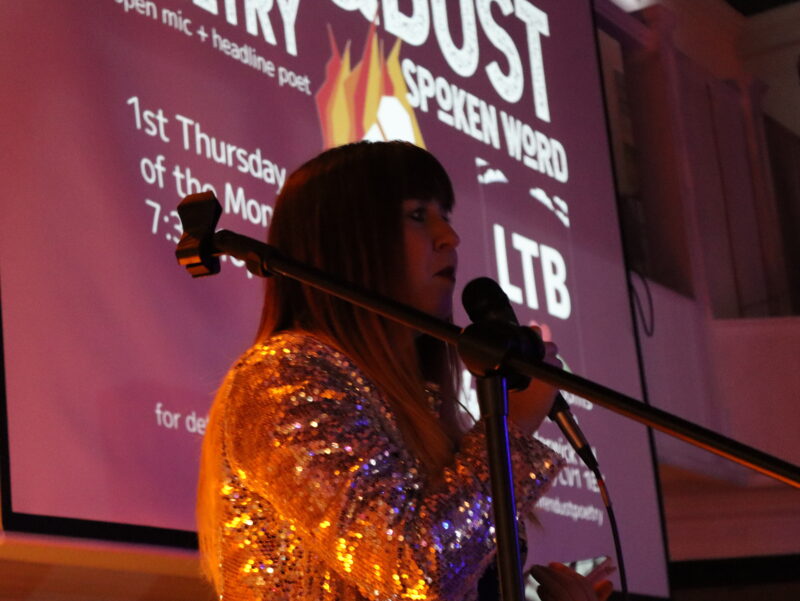
Emilie Lauren Jones recently finished her two-year term (Oct 2021-to Oct 2023) as Coventry city’s inaugural Poet Laureate. She has performed in a variety of venues, from libraries and village halls to Alexandra Palace and overseas in Dresden. Her words have featured on local and national radio and television, including two award-nominated TV shows. As well as participating in events, commissions and poetry projects, Emilie facilitates writing workshops for adults and young people. She also enjoys sharing her love of words in schools, in care homes and out in the community. Passionate about making poetry accessible to a wide audience, Emilie strongly believes art and creativity are for everyone. Her first book of children’s poetry – A Poetic A-Z of Awesome Animals – came out in October 2023 with Caboodle Books.
Emilie has been a valued member of the Fire&Dust community for many years and was our headline poet at the LTB on 4th January 2024. We caught up with her after the gig, to ask a few questions…
HCE: Tell us a little about yourself. Your background, your work, and the themes you like to explore. What inspired you to start creating and performing poetry?
ELJ: I always loved making up stories and by secondary school I found that I especially enjoyed poetry. I always knew I wanted to write as a job in some way but didn’t realise what being a poet involved until I was a bit older! I’m now a full-time freelance poet, but I previously had other part-time jobs while I tried to establish a career in poetry.
I always wanted to write and dabbled in short stories and non-fiction for a while, but nothing gave me quite the same joy as writing poetry. Over the years, I discovered more about modern poetry and what being a poet could entail. In case others would like to know this too, while I can’t speak for all poets, my job mostly consists of: running workshops at events or for community groups, visiting schools, writing commissions, performing either my solo stuff or Musical Metaphors (our poetry and classical music show), guest speaking, mentoring, critiquing, and creating/working on poetry related projects. Occasionally I find time to write for pleasure too!
Fire & Dust was a big catalyst for creating poetry as I always wanted to challenge myself to read something new each month. The first time I performed poetry I was 18 and it was for a talent competition at my local pub, which I was lucky enough to win.
HCE: Who is your work aimed at – do you have an ideal audience in mind when you’re putting a poem together?
ELJ: Sometimes I have an audience in mind, usually if I’m writing for a commission. When I wrote my children’s book, I also had in mind the age range I was targeting as well as being aware that I wanted to create poems that could be used as teaching resources too.
When I’m writing poetry for an adult audience, I tend to write something I think I’d enjoy reading and hope that others do too! I’ve learned now that not everyone will like my poetry and that that’s okay. Understanding that takes a lot of the stress away.
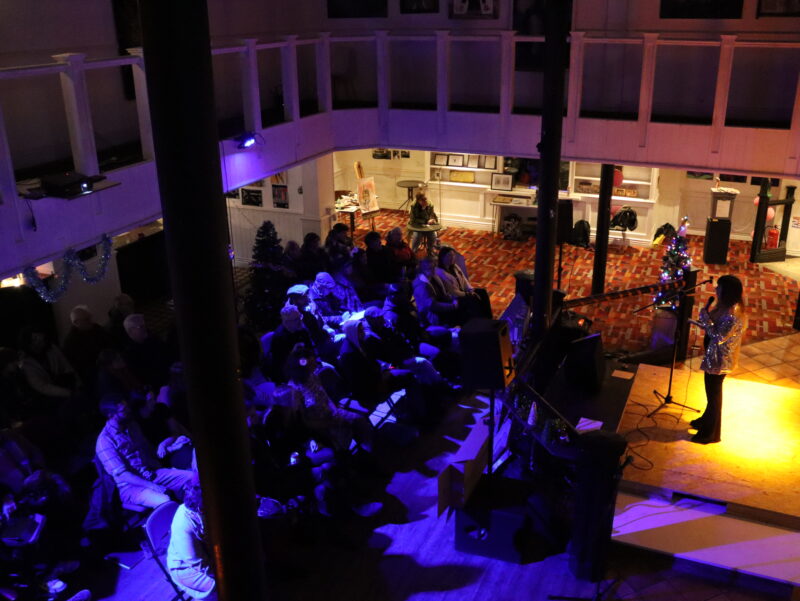
HCE: What was the experience of being Coventry Poet Laureate like for you? Can you share some details and highlights of what that role involved, and what sort of impact the laureateship has had on your practice as a writer?
ELJ: Incredible! I really didn’t expect to get the role because, as we all know, there are many talented poets in Coventry, but I applied in the hope that I would be shortlisted and could add that to my CV.
The role doesn’t come with any specific jobs or funding but it does give you a platform to create opportunities for yourself and the validation of having ‘a title’ is really helpful especially when applying for funding. The role also made me realise how many people in and around Coventry have no idea that there is a really strong poetry community here! It’s made me extra passionate about bringing poetry to non-poetry audiences and thinking of creative ways to slip it into other events they are comfortable going to!
HCE: Your Fire&Dust set was well-structured, with anecdotes and banter and smooth transitions. We’ve watched your confidence as a performer develop over the years into a compelling stage presence – any tips for beginners on how to shake off the nerves and be more engaging on the mic?
ELJ: Thank you, I really appreciate that feedback! As I began to feel more comfortable on a stage, I found I enjoyed bringing more of my personality to performances and I really liked it when I could make people laugh. After a while I caught on that I need to consider my performance as a whole when practicing, and that presentation is as important as the actual poems. I was very fortunate to receive the DYCP grant a couple of years ago and I received performance coaching and mentoring from Françoise Walot and Jasmine Gardosi, which made a big impact on my practice.
And a few tips for beginners (well, all poets really, including myself!):
- Watch live poetry, consider whose performances you find engaging and why.
- You can access live poetry events in person (e.g. Fire&Dust!) or it’s worth checking out YouTube channels like Apples and Snakes, SpeakEasyNYC and Roundhouse.
- Accept that we all feel nervous/excited when we perform and using those nerves to take your performance to the next level.
- Realise that it is okay for other people not to enjoy what you do! When it occurred to me, it took a lot of the pressure off, I used to get very worried because I thought every single person in the room had to think it was great otherwise I’d failed. My poetry and style isn’t for everyone and that’s fine!
- Attend workshops for performing poetry as well as writing it. It doesn’t matter how long you’ve been doing poetry, there is always more to learn.
- Access mentoring, this could be applying for mentoring programs like Dynamo or Room 204, connecting with local arts organisations to see if they can help or networking with other poets by attending events and joining poetry/writing groups.
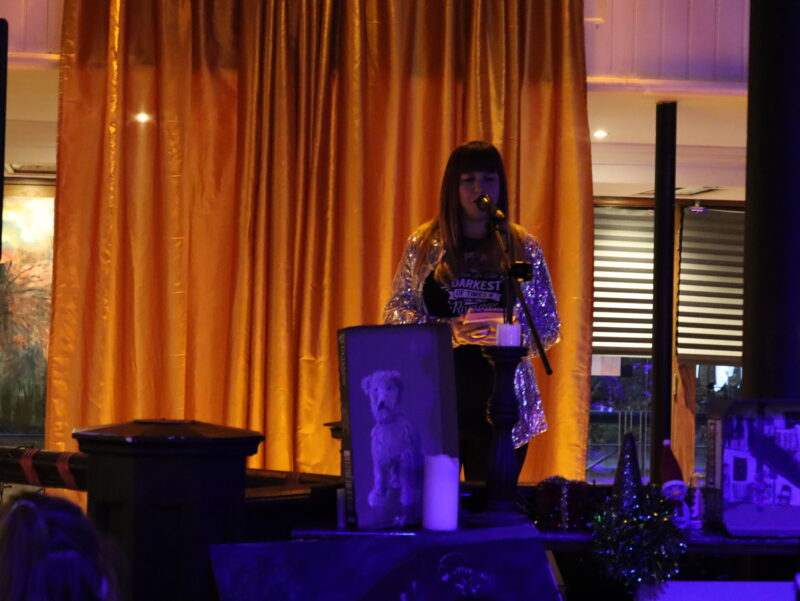
HCE: In your opinion, is Coventry a good place to be a poet/writer, and is there a thriving literary scene in the local region?
ELJ: Coventry is a great place to poet because there is such a supportive poetry scene. The only ‘problem’ is that so many local people don’t actually realise what a big creative community there is in Coventry so, like others, I do my best to shout about it and spread the word. We are very lucky to have Fire&Dust, it was one of the main places that gave me the confidence and connections to do what I do now. I have also made some fantastic friends along the way. One of the best places to find out about the local arts scene is the Facebook Group ‘Sitting Rooms of Culture’. I also have a bi-monthly newsletter that lists regular writing groups and events, people can sign up via my website. It would be very hard to be a writer in isolation, I continue to learn so much from others and it’s brilliant to have people who are happy to share their advice and experiences, there’s no way I could do it without being part of these communities.
HCE: Can you tell readers a little more about Positive Images Festival, and a few hints of what 2024 has in store for Coventry?
ELJ: Positive Images Festival began 30 years ago as a multicultural book festival taking place over a long weekend, it was founded by Colin Scott and Mehru Fitter. It has since become a year long event with a more concentrated festival time in June and July. This year we are planning a multicultural concert, a couple of exhibitions, a poetry and music evening, and a variety of events designed to improve wellbeing through creativity. All this alongside the annual poetry competition and regular art and poetry groups that take place each month. We’ll keep you posted!
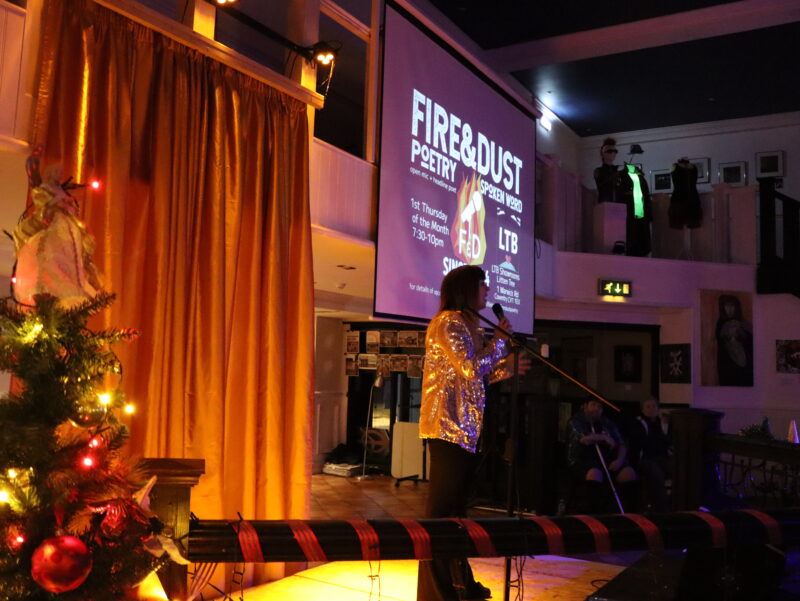
HCE: How would you define the difference between writing poetry aimed at children vs. writing poetry aimed at adults?
ELJ: The thing they have in common is that I try to write something I would enjoy reading. When writing the children’s poetry, I kept in mind that I wanted to use some of them as teaching resources during my school visits, so I purposely created poems that lent themselves to this and included a variety of poetic forms, from acrostic and kenning to tanka and ghazel. I also considered whether the children would a) relate to the poems and b) understand the language. There are some ‘trickier’ poems in the book which use slightly more complex language so the children can start with the easier ones and then challenge themselves.
HCE: What would you say are the skills required to facilitate a successful writing workshop? Do you put more of an emphasis on enjoyment or on encouraging participants to challenge themselves?
ELJ: I always hope to do both! Sometimes the achievement can be that the person has written something for the first time in ages or has read their work to a group when it makes them nervous. I also think the social side of running a regular group is important too, so I try to make space for that.
I’d say that some key skills would be:
- Flexibility: you need to go with what works best and not be afraid to amend the plan as you go along. Also, expect the unexpected!
- People skills: you need to like working with different people and should want to make them feel comfortable. I genuinely love meeting all the people who come to my sessions and it’s a real privilege to hear their ideas and their poems during the sessions.
- Passion: you should care about what you’re teaching and be excited by it, otherwise no one else will be either.
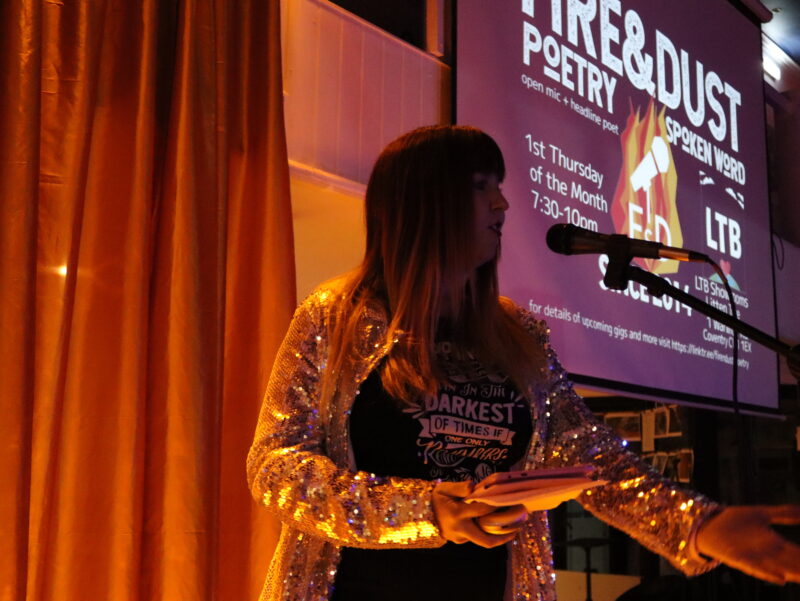
HCE: Why, in your opinion, should we encourage people (children and adults) to both read and write poetry for pleasure?
ELJ: Poetry offers the opportunity to connect us with our fellow human beings. We can explore cultures, places, emotions, different times, interesting objects… anything! I believe there is poetry out there for everyone, if you haven’t found any you like yet then keep searching. It doesn’t have to be ‘read’ either, it can be watched or listened to. Reading enhances our own creativity. I often find that when I read or hear poetry, it fires me up to write my own and reminds me that I have something worth expressing too.
HCE: What type of poetry do you seek out for personal enjoyment? As a reader/listener, when you engage with a poet’s work, what are you hoping to get out of it?
ELJ: It is so hard to keep this short! I genuinely try to read as widely as possible. I like people who push boundaries and explore interesting ways of using language. We have got some fabulous local poets in Coventry, Warwickshire and the West Midlands, I could do a huge list of just those. Here are a few other suggestions of poets whose work I absolutely love (I wish there was more room…): Suzannah Evans, Roger Robinson, Kim Moore, Jacob Sam-La Rose and Jehanne Dubrow. I can read and re-read these.
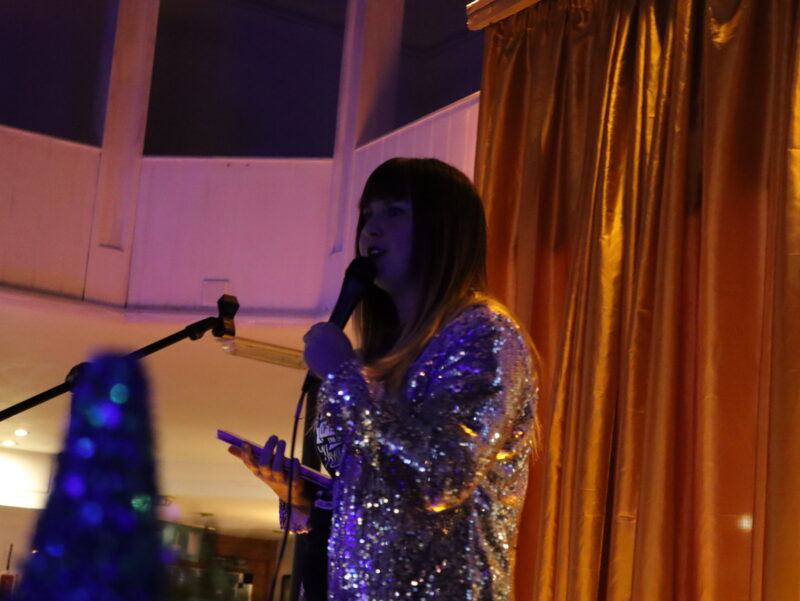
HCE: Did you read much poetry when you were a kid? Who were some of your favourite poets back then, and which collections would you recommend for parents wanting to add some contemporary poetry to their children’s bookshelves? (After they’ve bought yours, of course!)
ELJ: My time at Coventry University led me to begin to discover more modern poetry as well as poetry organisations and events including Writing West Midlands, the Coventry Writers Group and, of course, what is now Fire & Dust (I don’t recall it being called that, but I went to listen to poetry at The Tin a few times in my student days)! I wish I’d heard about poetry opportunities for younger writers when I was one but I just didn’t know they existed, that’s why I always try to signpost people of all ages towards local and national events and opportunities.
The first poetry collection I owned was Edward Lear’s, so my very first poems are in limerick form as I thought that’s what a poem was!
For parents (and anyone getting into poetry) I would suggest trying poetry anthologies out, it’s a good way of discovering new poets and reading a variety of poems.
HCE: What’s next on the horizon for you? Are you already working on a new project/booked for upcoming performances?
ELJ: I usually have several projects on the go at once… During the first part of this year, I’ve been working with Authors Abroad to put on the first-ever Coventry and Warwickshire Schools Poetry Slam. I have discovered that we have incredible young poets in our area!
I’m also trying to find a publisher for my first poetry pamphlet, it’s been shortlisted by publishers a few times now but always just misses out. Publishers can hold onto it for a long time too, the last two each kept it for over a year before finally declining! The good side of this is that it’s given me plenty of time to adapt and improve it, so I’m hopeful the final product will be strong.
I’m continuing to work with some of Coventry’s twin cities on events as well as my regular workshops at Central Library and The Belgrade Theatre. Plus, there are plenty of one-off workshops and events happening around the country that I’m lucky enough to be part of. I love working locally but it’s also nice to travel around a bit too.
I’m also in the process of putting together a few more ideas for projects I’d like to work on in the next couple of years…wish me luck!
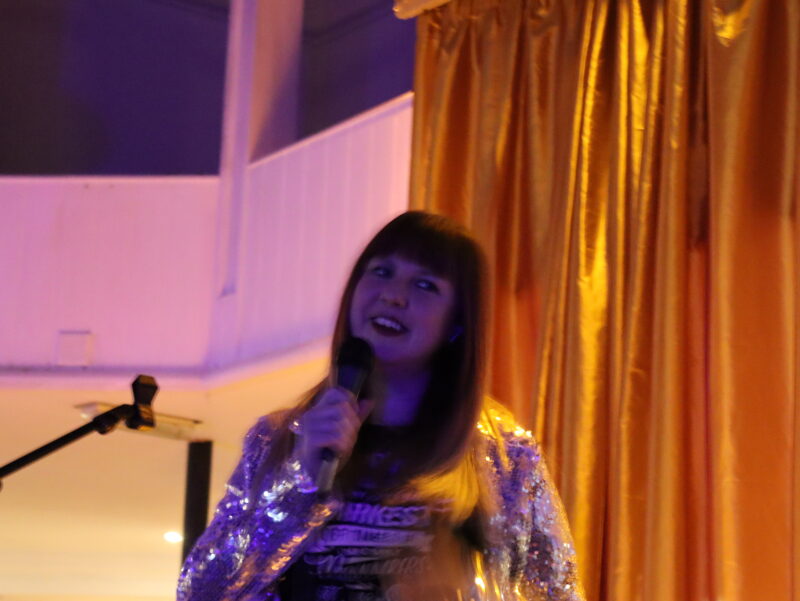
HCE: What’s the best way for people to keep connected with you and your work, or contact you for bookings?
Website(You can also subscribe to Emilie’s newsletter here; she puts it out every two months or so and it covers a bit about what she’s up to, as well as events and info for writers.)
HCE: Is there anything we didn’t cover that you’d like to share with our readers?
ELJ: No, great questions!
A Poetic A-Z of Awesome Animals is available online direct from Emilie’s website (signed/unsigned), as well as from other bookshops and retailers.
